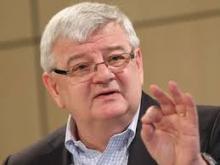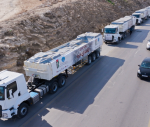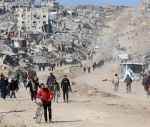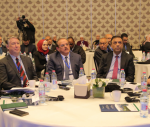You are here
Europe is home alone
Mar 10,2024 - Last updated at Mar 10,2024
BERLIN — Europe’s situation in 2024 is difficult, even dangerous. In Ukraine, Russian President Vladimir Putin’s war of aggression, an effort to wipe the country off the map and annex its territory, is entering its third year. In the United States, Donald Trump, the presumptive Republican nominee for November’s presidential election, is making wild threats against America’s longstanding allies, even encouraging Putin to attack European countries that do not spend at least 2 per cent of their GDP on defense.
If Trump wins in November, it would probably be the end of NATO and the American security guarantee. Europe would be completely on its own, trapped between an imperial Russian neighbour and an isolationist America on the other side of the Atlantic. Making matters worse, Europeans continue to cling desperately to an inherited grouping of “sovereign” nation-states, even though most are sovereign only on paper, because they are too weak to face current geopolitical realities on their own.
The situation demands greater European unity: namely, a common foreign policy, a joint military capability, a European nuclear umbrella and everything else that forms the basis of meaningful sovereign power in the twenty-first century. Europeans, however, remain unwilling to accept this fact.
Europe is economically prosperous, technologically and scientifically advanced and generally a good place to live (with strong democracies and the rule of law); but it is not a major power. That is a status it still needs to achieve, and it must do so quickly under the pressure of current events. The clear and present danger that Putin poses apparently has not been sufficient. Will the additional threat emanating from Trump do the trick?
Judging by past experience, it is easy to be pessimistic in this respect. Russia’s war has been going on for two years, and Europe still has not really come to terms with the fact that a great power is once again pursuing an imperial, predatory aggression against a smaller, peaceful neighbour. Apart from the East Europeans and the Scandinavians, most people in most European countries, including the political class, harbour illusions anchored in the bygone era of the post-1989 peace.
This mindset has had real-world consequences. Europe lacks ammunition, air defenses, heavy equipment and almost everything else that Ukraine needs to defend itself effectively. And now, there is a growing risk that US assistance for Ukraine will end, owing to Trump’s isolationist stranglehold on the Republican Party.
Yet, there is much more at stake in Ukraine than its own people’s freedom and sovereignty. The future of a democratic Europe itself is now in question. Putin wants a large-scale territorial revision of the post-Cold War map, to ensure Russia’s predominance and restore its status as a global power. He will do whatever it takes to achieve that objective, and he almost certainly will not be satisfied with taking only Ukraine. Russia has converted into a war economy and Europe must take that fact seriously.
As for Trump’s recent threat, it should come as no surprise. During his first term, Trump told the Europeans that he considers NATO obsolete, arguing that it has been kept alive at America’s expense, and that the US should quit it. The European response since then has been to cling recklessly to the status quo, as if nothing had changed. Now, Europe must make up for lost time as it prepares for the worst-case scenario: another Trump inauguration next January.
For a long time, the European Union could coast on the success of its single market and common rules. But faced with the imperial threat emanating from Russia and the danger of being abandoned by the US, it will have to become a military and political power in its own right. That means stepping up coordinated rearmament efforts to improve its own defense readiness and deterrence capabilities. The EU must bring the same focus and energy to bear on the goal of common security that it did on its successful economic modernisation.
Let us not fool ourselves: Putin and Trump, both separately and together, are forcing a historic paradigm shift in Europe. While prosperity and social protection remain important, Europe’s security will have to be the top priority on the agenda for years, and perhaps even decades, to come.
In the best-case scenario, the transatlantic alliance remains in place after the US elections. But we should not bet on it. Europe must firmly commit to strengthening its defense capabilities, because it has a neighbour that poses a long-term military threat and simply cannot be trusted. Continued European naivete could prove fatal.
Joschka Fischer, Germany’s foreign minister and vice chancellor from 1998 to 2005, was a leader of the German Green Party for almost 20 years. Copyright: Project Syndicate, 2024. www.project-syndicate.org














Add new comment